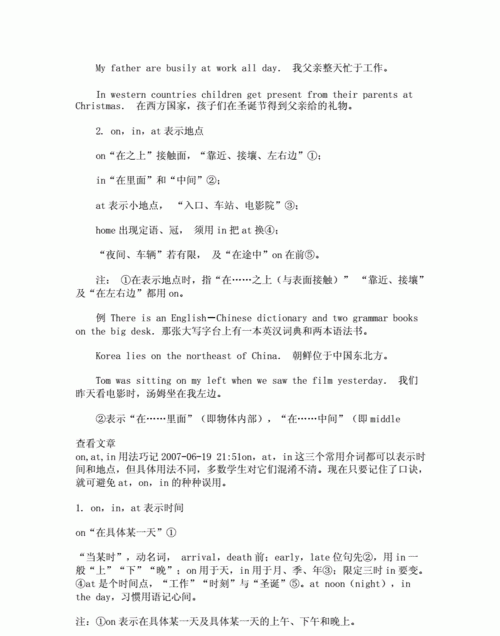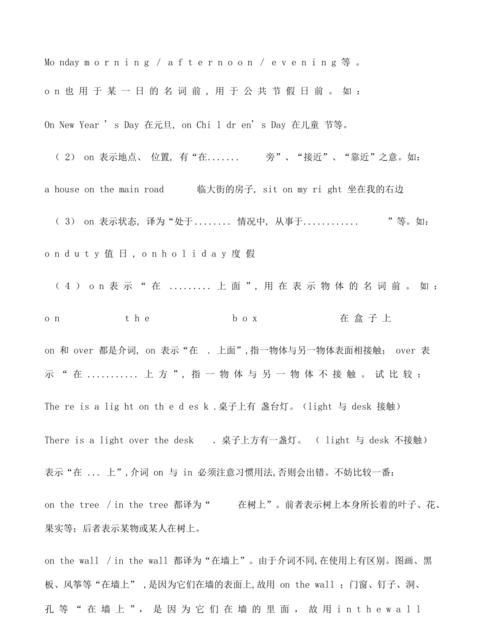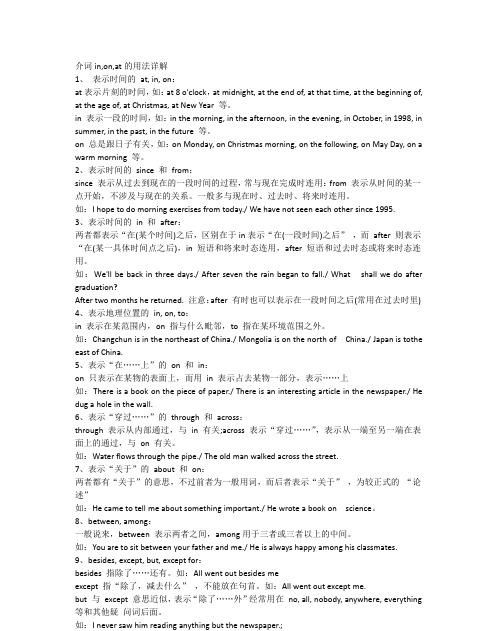本文目录
英语介词for的用法归纳
下面是我归纳的一些关于英语介词on的用法,以供大家学习参考。
介词on口诀:
日子、日期、年月日,星期加上早、午、晚,
收音、农场、值日on,关于、基础、靠、著论。
着、罢、出售、偷、公、假,故意、支付、相反,准。
特定时日和“一……就”,on后常接动名词。
年、月、日加早、午、晚,of之前on代in。
步行、驴、马、玩笑on,cab,carriage则用in。
日子、日期、年月日,星期加上早午晚; 以下皆用on。
例:
1. on Octorber the first 1949 1949年10月1日
2. on February the thirteenth l893 1893年2月13日
3. on May the first 5月1日
4. on the first 1号
5. on the sixteenth 16号
6. on the second of January 或 on January the second 1月2日
7. on a summer evening 在夏天的一个夜晚
8. on Boxing Day 在节礼日( 圣诞节 次日)
9. on New Year's Day 在 元旦
10. on my birthday 在我的生日
但 in the Christmas holidays在圣诞节假期; in the eighteenth century 在十八世纪; in ancient times 在古代; in earlier times 在早期; in modern times 在现代,则用in,the present time 现在,at the present day当今则用at。
1. on May Day 在“五·一”节
2. on winter day 在冬天
3. on Decenber 12th 1950 l950年12月12日
4. on Sunday 在星期天
5. on Monday 在星期一
6. on Tuesday morning 星期二早晨
7. on Saturday afternoon 星期六下午
8. on Friday evening 星期五晚上
但last night 昨夜;in the evening 在晚上; on time准时,in time及时,等则不同。
年月日,加早午晚,of之前on代in
例: on the morning of 18th 18日早晨
on the evening of 4th 4日晚上
On the eve of their departure they gave a farewell banquet and their head gave a garewell speech. 他们在临行前夕举行了一次告别宴会,他们的团长发表了告别讲话。
收音、农场,值日on
例:Did your supervisor like the story over (or on) the radio last night?
您的导师喜欢昨天从收音机里听到的 故事 吗?
I heard the news over (or on) the radio. 我从收音机里听到了这一条消息。
taIk over the radio 由无线电播音
on TV 从电视里......
hear something on the wireless 在无线电里听到
My brother works on an Army reclamation farm. 我哥哥在一个军垦农场工作。
The students are working on a school farm. 学生们正在校办农场劳动。
This is a farmer's house on a farm. 这是农场的农舍。
Who is on duty, tody? 今天谁值日?
We go on duty at 8 a.m. 我们上午8点钟上班。
关于、基础、靠、著论
例: This afternoon we are going to listen to a report on the international situation. 今天下午我们要听关于国际形势的 报告 。
Professor Shen will give us a talk on travelling in America. 申教授将给我们做关于美国之行的报告。
You are wrong on all these issues. 在这些问题上你的看法都错了。
The belief is based on practical experience. 这种信念是以实际 经验 为基础的。
Theory must be based on practice. 理论必须以实践为基础。
The people in the south live on rice. 南方人主食大米。(靠)
The citizens live on their salaries. 城市人靠薪金生活。
You can't afford luxuries, on an income of 100 yuan a month. 靠月薪100元的收入,你是买不起奢侈品的。
Her pet dogs were fed on the choicest food. 她用精饲料喂养她心爱的狗。
He is just a scrounger, who lives on other people. 他正是一个小偷,专靠损害别人过日子。
Keep the kettle on the boil (=boiling). 让水壶的水一直开着。
The enemy are on the run (=running). 敌人在逃跑。
on后接the加上一个作名词的动词.其意义与现在分词所表达的相近。 类似例子很多如:
on the march在行军中,on the mend 在好转中,on the prowl徘徊,on the move活动中,on the scrounge巧取豪夺(埋语),on the go活跃,忙碌,on the lookout注意, 警戒,on the watch监视着。on the hop趁不备抓住某人等等。
on the People's Democratic Dictatorship 《实践论》和 《矛盾论》
on the People's Democratic Dictatorship 《论人民民主专政》
"on Coalition Government" 《论联合政府》
着、罢、出售、偷、公、假,故意、支付,相反、准
注:口诀中的“着”是指着火,罢指罢工,偷指偷偷地,公指出差、办公事;假指休假,准指准时。
例:The house next to mine was on fire. 我邻居的房子着火了。
The workers of the railway station were on strike. 铁路工人罢工了。
Grapes and big water melons from Sinkiang are on sale on a large sale. 新疆葡萄和西瓜大量上市了。
do something on the sly (quiet). 秘密地(暗地里,偷偷地)做某事。
I've come here on business. 我是有公事来的。
They went to Bern on a mission. 他们到伯尔尼去执行一项使命。
They has been away on a long trip. 他们出去做一次长途旅行。
I'll go home on leave next month. 下月我将休假回家。
I went on business to Shanghai. I did not take leave. 我是公出去上海的,不是不告面别。
She came to see you on purpose. 她是专程来看你的。
He came here on purpose to discuss it with you. 他到这来是要与你讨论这件事的。
This lunch is on me.
"No. let's go Dutch."
“这顿午饭我付钱。”
“不,还是各付各的。”
On the contrary, it was very easy to understand. 相反,这事儿很容易理解。
P1ease come on time. (on schedule). 请准时来。
注:in time是“及时”的意思。
The train arrived on schedule. 火车准时到达。
特定时间和“一……就”,左右on后动名词
例:Gases expand on heating and contract on cooling. 气体加热时膨胀,冷却时收缩。(特定时间)
On entering the room, he found his friends dancing in high spirits. 一进屋,他就发现他的朋友们在愉快地跳舞。
On reaching the city he called up Lao Yang. 一到城里他就给老杨打了一个电话。
I'll write to him on hearing from you. 我接到你的来信就给他写信。(一……就)
以及on the left, right向左向右,on the stair在台阶上等。
步行、驴、马、玩笑on,cab,carriage用in
例:On foot步行; on horse骑马; on donkey 骑驴。
He rode on, blood flowing from his side. 他骑着马,鲜血从腰部流下来。
The soldier of the Eighth Route Army rode 100 li on a horse a day in order to catch up with his unit. 为赶上部队,那位八路军战士骑马日行百里。
Go on horse back! 骑马去!
You are having me on! 你和我开玩笑呢!

介词on的用法
介词on表示时间、地点、方位等.
(1)on表示时间,用于星期、日期(包括该天的各部分).如:on Sunday/Sundays,on Monday morning/afternoon/evening等.
on也用于某一日的名词前,用于公共节假日前.如:
On New Year's Day 在元旦,on Children's Day 在儿童节等.
(2)on表示地点、位置,有"在.旁"、"接近"、"靠近"之意.如:
a house on the main road 临大街的房子,sit on my right 坐在我的右边
(3)on表示状态,译为"处于.情况中,从事于."等.如:
on duty 值日,on holiday 度假
(4)on表示"在.上面",用在表示物体的名词前.如:
on the box 在盒子上
on和over都是介词,on表示"在.上面",指一物体与另一物体表面相接触;over表示"在.上方",指一物体与另一物体不接触.试比较:
There is a light on the desk.桌子上有盏台灯.(light与desk接触)
There is a light over the desk.桌子上方有一盏灯.(light与desk不接触)
表示"在.上",介词on与in必须注意习惯用法,否则会出错.不妨比较一番:
on the tree/in the tree都译为".在树上".前者表示树上本身所长着的叶子、花、果实等;后者表示某物或某人在树上.
on the wall/in the wall都译为"在墙上".由于介词不同,在使用上有区别.图画、黑板、风筝等"在墙上",是因为它们在墙的表面上,故用on the wall;门窗、钉子、洞、孔等"在墙上",是因为它们在墙的里面,故用in the wall.
有疑问在线交谈 祝你新年快乐 天天开心 心想事成 ...

on的意思和用法(最好有例句)
on
介词 prep.
1.在...上
He laid a hand on my shoulder.
他把一只手放在我肩上.
2.以...支持,挂在...上;以...为轴
There is a picture on the wall.
墙上有一幅画.
3.朝,向
4.靠近,在...旁,沿着
She stood on my left.
她站在我左边.
5.在...的时候,在...后立即
He jumped with joy on hearing the news.
他一听到这个消息就高兴得跳了起来.
6.关于,有关
The teacher made comments on our compositions.
老师就我们的作文作了讲评.
7.以...方式,通过
Did you hear it on the radio?
你是从收音机听到这消息的吗?
8.凭...,靠...;使用...,吃...
They said they were acting on instructions.
他们说他们是奉命行事.
9.处于...状态,进行中
10.属于...,参加...,是...的成员
He is on the school volleyball team.
他是校排球队队员.
11.加之于,重叠于
12.由...支付
Have another coffee on me.
再来一杯咖啡,我请客.
13.带在...身上
副词 ad.
1.继续
They talked on until midnight.
他们一直谈到深夜.
2.向前
3.穿上,盖上,连接上
It's cold today.Why don't you put your overcoat on?
今天很冷.为什么不把大衣穿上?
4.(机器)处于工作状态;开着;通着
He left the engine on while waiting for Joe.
他在等候乔时让汽车引擎开着.
5.上演着;在进行中
形容词 a.[Z]
1.(机器等)工作着的,开着的
2.正在上演的,在放映的
What's on for tonight at the cinema?
今晚电影院上映什么片子?
3.在发生的,在进行的
The strike is still on.
现在仍在罢工.
4.菜单上有的,供应的
I'd like to have some salmon if it is on.
如果有大马哈鱼供应,我想来一点.
5.【俚】知情的
6.【美】【俚】醉了的

on的用法
on表示“在物体的表面上”;通常用作介词,表示在……上;向,朝等含义。用作副词,表示向前(移动);用作形容词,表示在进行的,在发生的等含义。
The book is on the table.
书在桌子上。
The spider is walking on the ceiling.
蜘蛛在天花板上爬行。

辨析:
on, against, for, with
这四个介词均可表示“对…的态度”。其区别是:
against指在观点或主张等方面与某人采取对立的态度,意思是“反对”“与…对抗”; for指在观点或主张等方面与某人采取合作一致的态度,意思是“支持”“赞成”。
on常与side连用,表示“站在…一边”; with常指在观点或主张上与某人采取一致的态度,意思是“与…一致”“与…站在一边”,但有时也可指“与…对抗”“站在…的对立面”。
以上就是关于on的用法和例题 ,英语介词for的用法归纳的全部内容,以及on的用法和例题 的相关内容,希望能够帮到您。

